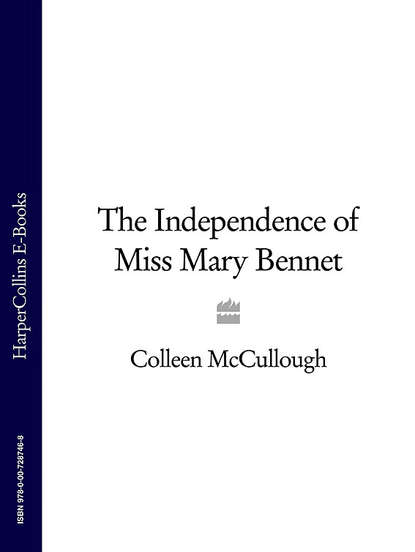По всем вопросам обращайтесь на: info@litportal.ru
(©) 2003-2024.
✖
The Independence of Miss Mary Bennet
Настройки чтения
Размер шрифта
Высота строк
Поля
“Believe me, Mary, you have been useful, and will be useful again — at Pemberley or Bingley Hall.”
“No,” she said, meaning it.
“Be sensible, woman!”
“When I was a girl, I had no sense. It was not inculcated in me because I had no example to follow, including my parents as well as my sisters. Even Elizabeth, who was the cleverest, had no sense. She did not need sense. She was charming, witty, and full of sensibility. But to have sensibility is not to have sense,” said Mary, fairly launched. “Nowadays, brother Fitz, I have so much sense that you cannot bully or cow me. To have sense is to know what one wants from life, and I want to have a purpose. Though I admit,” she ended rather pensively, “that I am not quite sure yet what my purpose will be. What it will not be is to live with either Lizzie or Jane. I would be underfoot and a nuisance.”
He gave up. “You have a month,” he said, getting to his feet. “The bill of sale for Shelby Manor will be signed then, and your future must be decided. Banish all thought of living alone! I will not permit it.”
“What gives you the right to dictate to me?” she asked, spots of colour burning in her cheeks, her eyes glowing purple.
“The right of a brother-in-law, the right of your senior in years, and the right of a man owning sense. My public position as a Minister of the Crown, if not my private standing as a Darcy of Pemberley, makes it impossible for me to tolerate eccentric or otherwise-crazed relatives.”
“What will eight and a half thousand pounds buy me?” she countered.
“A dwelling I will happily find you, provided that you live in it with proper decorum and propriety. In the country rather than the city — Derbyshire or Cheshire.”
“Hah! Where you can keep an eye on your eccentric or otherwise-crazed sister-in-law! I thank you, no. Is the eight and a half thousand pounds mine, or is it put in trust for me? I want a direct answer, for I will find out the truth anyway!”
“The money is yours, safely invested in the four-percents. Kept invested, it will give you an income of about three hundred and fifty pounds a year,” Fitz said, having no idea how to deal with this termagant. On the outside she was so like Elizabeth — did that mean Elizabeth harboured a termagant too?
“Where is it lodged?”
“With Patchett, Shaw, Carlton and Wilde in Hertford.”
The look in her eyes gave him fresh pause: about to go to the door, he delayed. “You will kindly allow me to conduct your business, sister,” he said, voice adamant. “I forbid you to do it yourself. You are a gentleman’s daughter, allied to my own family. It would not please me were you to defy me. In the new year I expect you to give me a satisfactory answer.”
Apparently put in her place, she followed him out of the room and down the hall to the front door, where Lizzie and Charlie had assembled, together with Hoskins, the dour woman who maided Elizabeth with fierce possessiveness.
Mary took Charlie’s face between her hands, smiling into his dark grey eyes tenderly. A beauty almost epicene, yet below it lay no feminine streak at all, if his self-absorbed father had only one-tenth of the brain the world accorded him to see it. Do not despise Charlie, Fitz! she said silently, kissing Charlie’s smooth cheek. In him lies more of a man than you will ever be.
Then it was Lizzie’s turn, and the party sorted itself out; Darcy astride a dappled grey horse as proud as Lucifer, Lizzie and Charlie in the coach with heated bricks, fur rugs, books, a basket of refreshments, and Hoskins. Hand up in a wave, Mary stood on the top step until the lumbering vehicle, its six gigantic horses making light of their load, disappeared around the bend all drives had, and so out of her life. For the time being, at any rate.
Mrs Jenkins was weeping; Mary eyed her in exasperation.
“No more tears, I beg you!” she said severely. “Shelby Manor will go to Sir Kenneth Appleby, I am sure of it, and Lady Appleby will prove as pleasant a mistress as he a master. Now get my own boxes from the attic and start preparing my belongings for packing. Not a crease, not a speck of dust, nothing chipped or dirty. And send Young Jenkins for the chaise. I am going out.”
“To Meryton, Miss Mary?”
“Heavens, no!” cried Miss Mary, actually laughing! And it so soon after her mother’s death! “I am going to Hertford. You may expect me home for tea. Home!” she repeated, and laughed again. “I do not have a home. How emancipating!”
Not having much to do, Mr Robert Wilde got up from his chair and moved to the window, there to gaze out at the muted bustle of the high street. No one had asked him to draw up a will or consulted him about some matter requiring the deftness of a lawyer’s touch, and a natural industry had long since reduced the assortment of pleated, red-taped files to perfect readiness. As today was not market day, the view offered him more pedestrians than wagons and carts, though there went Tom Naseby in his gig, and the Misses Ramsay perched upon their plodding ponies.
There he is again! Who the devil is that fellow? asked Mr Wilde of himself. Hertford was a very small capital of a very small county, so the stranger had been noticed by all and sundry — black–avised and big as a bear was the verdict of all who saw him. Sometimes he was mounted on a massive thoroughbred whose leggy lines contradicted the rider’s low appearance and garb, or else he was leaning against a wall with muscular arms folded, as now. The mien of a villain, Mr Wilde decided. His under-clerk had informed him that the fellow was staying at the Blue Boar, spoke to no one, had sufficient money to buy the best dinners, and had no inclination to avail himself of one of Hertford’s few trollops. Not an ill-looking villain, nor a very old one. Yet who was he?
A chaise came down the slight hill, drawn by two pretty greys, with Young Jenkins riding postilion: the Shelby Manor equipage, a familiar sight. Miss Mary Bennet was in town to shop or visit. When it stopped in front of his door Mr Wilde was surprised; though he managed all Shelby Manor’s business, he never had been permitted to meet the beautiful Miss Bennet, though he had seen her often enough. Mr Darcy had called on his way north to Pemberley — the last of several visits — but had said nothing about sending Miss Bennet to see him. Yet lo! here she was! She emerged clad in black from head to foot, her glorious hair quite hidden by a black cap and hideous bonnet. Her handsome face wore its customary composed expression as she trod up the steps to his front door, there to ply its knocker.
“Miss Bennet, sir,” said his clerk, ushering her in.
By this time Mr Wilde was standing the correct distance away, his hand out to touch her fingertips, all the shake propriety allowed. “My condolences upon the death of your mother, Miss Bennet,” he said. “I was at the funeral, of course, but did not condole in person.”
“I thank you for your sentiments, Mr Wilde.” She sat down stiffly. “You look a little young for a senior partner.”
“I doubt there ever was a Patchett,” he said with a smile, “Mr Shaw and Mr Carlton are deceased, and my father handed the practice to me a full five years ago. I do assure you, Miss Bennet, that I have served my articles and am fully conversant with a solicitor’s duties.”
This rather unprofessional statement did not thaw the lady’s expression; clearly she was impervious to charm, of which dubious asset Mr Wilde knew he owned much. He coughed an apology.
“You are the custodian of a sum of money due to me, is that correct, sir?”
“Why — er — yes. Forgive me, Miss Bennet, while I find your particulars.” And he ran a hand across a shelf of files marked B until a fat folder caught his attention, was removed. He sat down at his desk, untied its red tape, and perused it. “Eight and a half thousand pounds, invested in the four-percents.”
Tucking her gloved hand back inside her muff, Miss Bennet looked relieved. “How much interest has it accrued?” she asked.
His brows rose; ladies did not usually betray such a vast knowledge of financial matters. Back he went to the papers. “As of last quarter-day, one thousand and five pounds, nineteen shillings, and fourpence,” he said.
“In toto, nine and a half thousand pounds,” she said.
“That is correct, give or take a pound.”
“How long will it take to withdraw it from the Funds?”
“I could not advise that, Miss Bennet,” he said gently.
“No one asked you to, sir. How long?”
“Some weeks. Perhaps the middle of January.”
“That will be satisfactory. Kindly commence the process, Mr Wilde. When my money is free, deposit it in the Hertford bank. You will arrange that I can draw upon it from any bank anywhere in England.” She paused, nodded. “Yes, England will suffice. Scotland, I believe, has its own laws and customs, and Ireland is full of Papists. Wales I regard as a part of England. Further to my needs, sir, I understand that Shelby Manor is already sold, and I must vacate it. It would suit me to vacate before Christmas, rather than after. Kindly find me a small furnished house here in Hertford, and rent it for six months. I will be travelling by next May, and will no longer need a Hertford residence.”
His jaw had dropped; he cleared his throat, about to utter reasonable persuasions, then decided not to bother. If ever he had seen determination writ upon a face, he saw it now in Miss Mary Bennet’s. “With servants?” he asked.
“A married couple, one maid above stairs, a cook and below stairs maid, if you please. I do not intend to entertain, and my needs are simple.”
“And your lady’s companion?” he asked, making notes.
“I will not have one.”
“But — Mr Darcy!” he exclaimed, looking horrified.
“Mr Darcy is not the arbiter of my destiny,” said Miss Bennet, chin out-thrust, mouth a straight line, heavy-lidded eyes anything but sleepy. “I have myself been a dreary female for long enough, Mr Wilde, not to want another foisted on me as a reminder.”
“But you cannot travel unattended!” he protested.
“Why not? I will avail myself of the services of the maids at the various hostelries I patronise.”
“You will provoke gossip,” he said, plucking at straws.
“I care as little for gossip as I do for idleness, and have been prey to both for far too long. I am not a helpless female, sir, though I am sure that you, like Mr Darcy, thus regard all of womankind. If God has seen fit to release me to do His work, then God will be my helpmate in everything, including the attentions of the unworthy and the importunities of men.”














